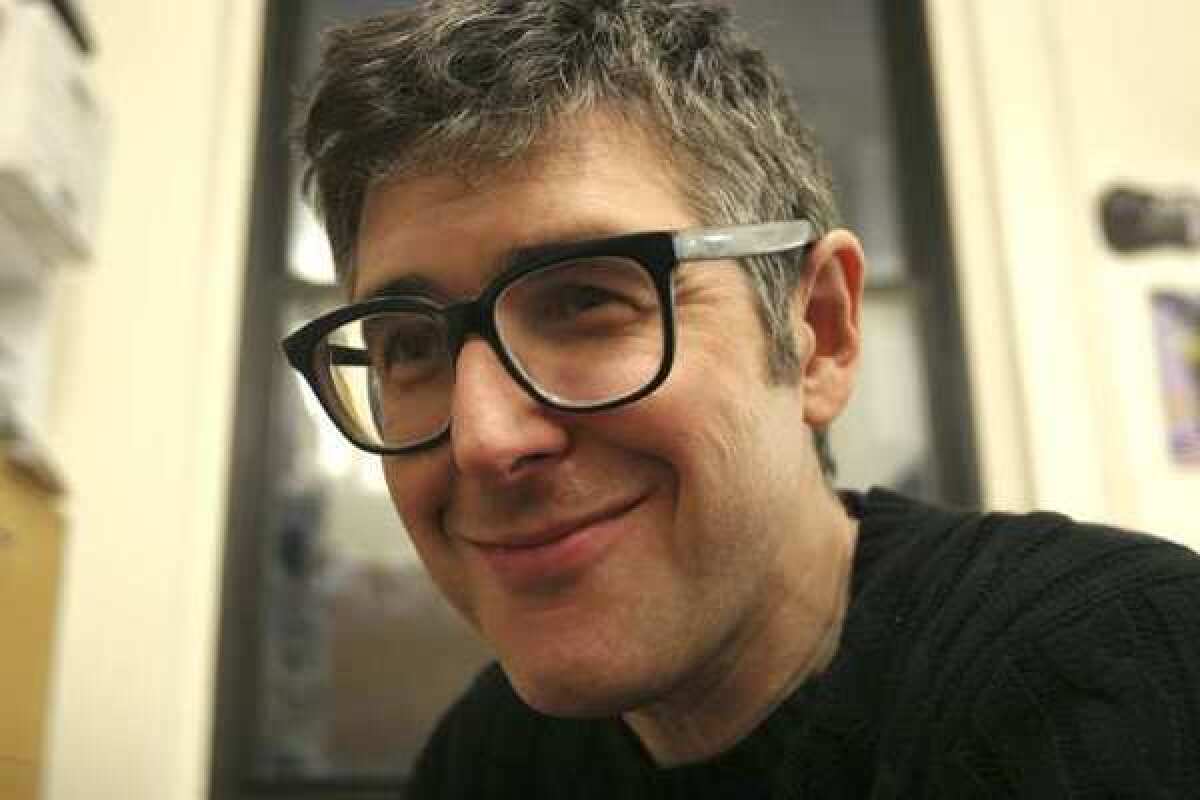Daum: When truth is trumped by theatrics

- Share via
Even if you don’t have a cupboard full of pledge-drive coffee mugs, you’ve probably heard about the latest dust-up in public radio. A stage performer named Mike Daisey chronicled a trip he made in 2010 to China to check out conditions at a factory run by Foxconn, the chief manufacturer of iPads and iPhones. Even before Daisey told his tale, news reports of suicides and harsh working conditions there had introduced at least a dose of guilt into the previously sunshiny experience of owning an Apple product.
As it turned out, Daisey’s story vividly humanized that guilt. He told of meeting workers who were 13 or 14 years old. He described meeting with a man who, after mangling his hand assembling iPads, slides his claw-like appendage across the touchscreen and pronounces the device “magical.”
Though many details of Daisey’s monologue are true, those — plus some others — turned out not to be. Daisey invented people, encounters and testimony for dramatic purposes, then allowed an edited portion of his monologue to be aired on “This American Life” — which, for all its emphasis on storytelling, adheres to the same journalist standards as public radio’s news programs. Daisey knew about those standards and indicated to the show’s producers that he was upholding them.
The hourlong story became the most downloaded show in the 16-year history of “This American Life.” And the first one that required a retraction.
On Friday, in an episode titled, simply, “Retraction” — and in what you might call the thinking-man’s version of Oprah dressing-down fake memoirist James Frey — Daisey was grilled on the air by the show’s host, Ira Glass. Daisey admitted to fabrications and dodges, but he also stood by his story “in a theatrical context.”
“We have different languages for what the truth means,” he said.
Much of the talk about this story suggests that Daisey’s “theatrical truth” has a simple binary relationship with journalistic, fact-checked truth. In other words, you’re either with truth or against it. You’re either an artist who luxuriates in creative liberties or a reporter who hews dutifully to verifiable, if sometimes boring, facts.
But this view, despite the opportunities for righteousness on both sides, is ultimately a limited one. It overlooks not just the gut-based knowledge that’s come to be known as “truthiness” but, more important, the way human beings lie to themselves and others on a daily basis, the way we all select facts to govern our personal lives and decisions that work to our own benefit and convenience, and occasionally even our sanity. This is often called “personal truth.” And for most people, it’s the one that matters most.
Personal truth is what we “know” about ourselves. Oprah was a great champion of it; her signature question, “What do you know for sure?,” rendered answers ranging from “All you need is love” to “Always wear a bra.” But unlike artistic truth, personal truth needn’t always serve “larger truth.”
“Knowing” that you were put on Earth to serve the poor counts as a personal truth. Then again, so does “knowing” that it’s better for the environment to leave your dog’s poop on the ground rather than pick it up with a plastic bag.
Once upon a time, such ideas were labeled “beliefs.” They were private expressions of character rather than agents of certitude. But in an age of reality television, of fiction that masquerades as memoir and an Internet culture that allows anyone to say just about anything and declare it gospel, mere belief isn’t good enough. In order for an idea to gain traction, it needs to present itself as truth. And given all the self-proclaimed truths competing for airtime, it also better be non-boring as well as verifiable.
If Daisey’s radio monologue fell short of that goal, “Retraction” actually came pretty close to reaching it. Unlike Oprah, who mostly told Frey how betrayed she felt, Glass parsed the actual facts with actual reporters and admitted to the show’s complicity, however unwittingly, in the deception. Along the way, he answered the central question of the whole debate: Can journalistic truth ever have the same power as theatrical truth?
The answer, it seems, is yes. “Retraction” is arguably even more riveting than the material it retracted. And though it hasn’t broken Daisey’s record, it’s already been downloaded or streamed more than 600,000 times.
More to Read
A cure for the common opinion
Get thought-provoking perspectives with our weekly newsletter.
You may occasionally receive promotional content from the Los Angeles Times.











